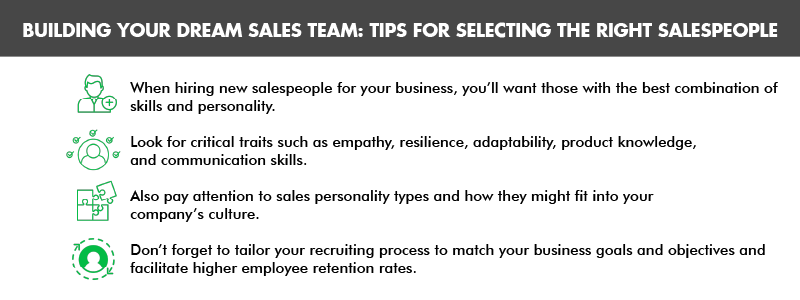Shifting Gears: A Guide to Sales Team Role Changes
Explore how shuffling roles and responsibilities can improve your team’s job satisfaction, increase


Salespeople are the architects of revenue and success for your company. They serve as the vital link between prospective customers and your bottom line, increasing your chances of profit and growth.
Ideally, your sales team will be the key factor in converting potential leads into loyal customers, driving revenue, and propelling your company toward unparalleled success. But all salespeople aren’t created equal, which is a common reason why some businesses don’t succeed.
With that in mind, it’s important to understand that choosing the right salespeople from the vast pool of available options is one of the most crucial decisions you can make for the long-term health of your business. An excellent salesperson is the key to unleashing your company’s full potential to effectively navigate challenges, build lasting customer relationships, and ultimately succeed.
But what defines an ideal salesperson, and how can you identify the perfect fit for your business? Continue reading to find out!
Effective salespeople are those who successfully connect with prospects and close deals. Not surprisingly, they often possess a few common characteristics, including:
While everyone is different, most salespeople can be grouped into one of these personality types:
1. HustlersA hustler is a salesperson who's driven and focused on clear goals and aspirations. Hustlers don't make excuses, never take no for an answer, and take on different prospects, including difficult individuals their colleagues abhor. While their zeal may position them to close a lot of deals, they’re not usually very good at building strong relationships. They also tend to come off as pushy.
2. ChallengersMost Challengers have strong negotiating and resilience skills. But like Hustlers, they often come across as overly aggressive and pushy.
3. Lone wolves
Lone Wolves are not team players. They prefer to work alone instead of collaborating with others. They mostly thrive in solitary environments where they can take control of the entire sales process from start to finish. While they can often be highly effective, they rarely seek help when needed, which can cause problems. Plus, their performance often lags when team-oriented projects are involved.
4. Team players
Team Players are the exact opposite of Lone Wolves, meaning they excel the most when they’re a part of a group. Their collaborative and cooperative attitudes often play a significant role in boosting overall team performance. On the other hand, they aren’t likely to perform well in independent sales roles. Plus, since they rely heavily on their colleagues’ input, Team Players often have trouble making quick decisions, especially on their own.
Now that you’re familiar with the different types of sales professionals, let's discuss how to identify and hire the best fits for your organization.
Sounds easy, right? Yeah, not so much. Which is why it often pays to bring in some outside help to make sure you’re hiring the best salespeople for your organization.
At MetaGrowth Ventures, we understand that recruiting new salespeople can be incredibly time-consuming and challenging. But it doesn’t have to be. Our team of sales training experts can streamline your entire hiring process – from recruiting to onboarding – leaving you free to focus on the big picture of running your business.
Would you like to leverage the power of successful recruitment workflows to find the best salespeople for your company? Connect with MetaGrowth today, and let’s start developing a strategy for building that world-class sales team you’ve always dreamed of.
Written by
Josh Hirsch
Explore how shuffling roles and responsibilities can improve your team’s job satisfaction, increase
Sales reps often experience burnout that can lead to high turnover rates when left unchecked. Savvy employers
Sales reps spend only a fraction of their time selling, which translates to loss of productivity for them and